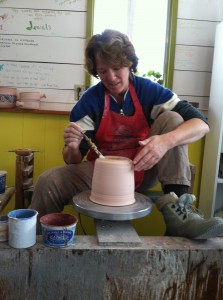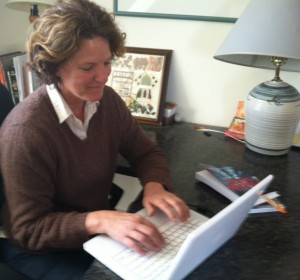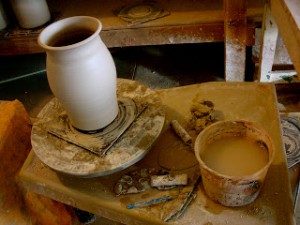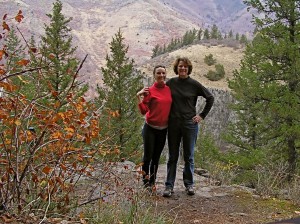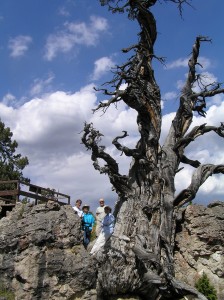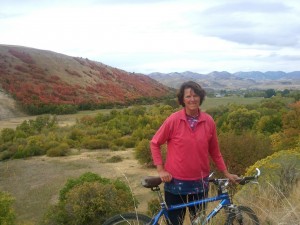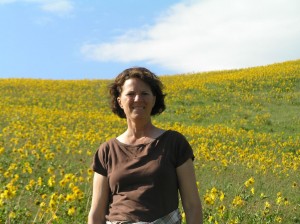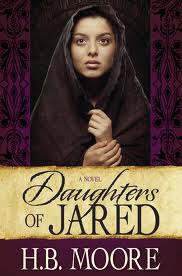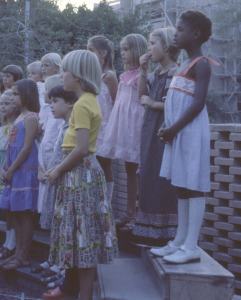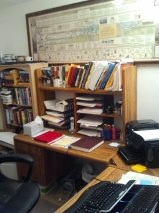(NOTE: I’m afraid my postings may be a bit sparse for the next couple of months since I’m in the throes of reading Whitney Finalists, but if you’re a writer and would like to be interviewed as part of my “Wednesday Writer” series, please let me know in a comment below.)
I’ve wanted to get to know Carole better for some time now because I could sense she was a kindred spirit through some of her blog posts and comments in the LDStorymakers email loop. The fact that she has a new book out–POACHING DAISIES–gave me the perfect opportunity. I’m happy to say she provided me with lots of great pictures, too!
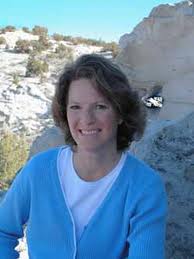 ME: What were some of the most formative events from your childhood, the ones that made you the person and writer you are today? (And I’d love a picture of you as a child to share with readers.)
ME: What were some of the most formative events from your childhood, the ones that made you the person and writer you are today? (And I’d love a picture of you as a child to share with readers.)
CAROLE: It’s easy for me to look back and see the turning points that sparked my interest in writing. My mother took a creative writing course through the mail and I remember her typing her stories and reading them to us. She also was a reporter for the Orem Geneva Times. She was a member of the League of Utah Writers and attended Round-up several times. She took me with her to hear Louis L’Amour when I was in junior high (What a wonderful opportunity!) and I took third place in the youth division for fiction.
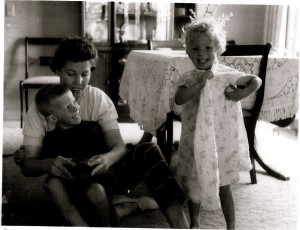 (That’s Carole with her mother and brother. She says that for most of her childhood, she thought the table arrangement behind her was her hair. :D)
(That’s Carole with her mother and brother. She says that for most of her childhood, she thought the table arrangement behind her was her hair. :D)
Several of my teachers through the years told me I was a good writer. I knew from a young age that I wanted to be a writer. It wasn’t until I was in high school that the creative dream expanded to include pottery. I was the youngest of five and the only girl in our family. Life at our house was chaotic. I would often seek a quiet spot in the house or my room to read or to write. My imagination was always huge and when I played with my friends, I was the one who was constantly coming up with the pretend scenarios. In college, I took creative writing classes along with my art classes. I never could choose one over the other, so years after graduating in art, I went back to college and got a degree in English. (Congratulations and good for you!)
ME: If you had to choose between pottery and writing, which would you choose and why?
CAROLE: That is a really hard question. (Sorry…) I honestly can’t imagine having to give up either one. I used to tell people that giving up pottery would be like cutting off my arm. It’s so much fun. Writing is a different kind of outlet and a different kind of energy. I go through phases where one has to take over and become more important. In the summer, it’s all pottery. But when I’m editing and re-writing, I have little time for pottery.
Since you insist on choosing, I will go with pottery, mainly because it never lets me down. There is rejection in the process of getting in shows and things, but the rejection doesn’t feel as personal or as painful as getting a rejection on a book. Writing is a great way to work through problems, but it often leaves me feeling raw and sometimes drained of energy when I write about a difficult situation in my life. The pottery energizes my soul and doesn’t leave me feeling depleted. I feel happier when I’m making pottery. On the other hand, I only have a couple of good potter friends, but I’ve made dozens of friends through my writing. I would never want to give up the friendships I’ve made. So what a hard choice!
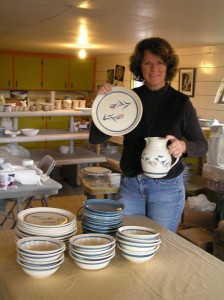 (And we can understand why when we see the fruits of her gift…I’d love a dinner set!)
(And we can understand why when we see the fruits of her gift…I’d love a dinner set!)
ME: Why do you write? What are you striving for with each book or story, and what are you hoping the reader comes away with?
CAROLE: So far, my books have been for fun. I like to tell stories. I like to listen to stories. I like to read stories. I’m the one who is listening in on conversations in restaurants hoping to glean a nugget I can use in a story. (So that was you the other night, eh?) I am a great observer.. So what I hope is that I’m successful in getting the reader to escape, to laugh, and to think.
A recurring theme (hopefully not too overt) in all my novels is that people aren’t always what they seem. The kindest person in town may not be the most successful. I love small towns and I think that’s reflected in all my stories too. Other than my novels, I do write a lot of personal reflection essays. Some of these have made their way to blogs, but some are too personal even for that. That kind of writing is the way I deal with the more difficult aspects of life and religion. I used to be a great “letter to the editor” writer, but ever since blogging came along, I’ve found I can get most of what I need to say out and only contribute to the newspaper occasionally.
ME: What are the similarities and differences between creating a good ceramic piece and creating a good story? (And I’d love a picture of you at work doing each.)
CAROLE: Creating something that wasn’t there before. Always doing your best, whether or not you are creating an essay, blog post, novel, bowl, mug, or vase. The first idea that comes is often cliché, so take that idea and make it better. The ideas come similarly. For writing, an idea will come and it develops in the process. In pottery, the ideas come more quickly because the process is so much faster from start to finish–unless it’s a short writing piece.
There is art and crafting in each skill. There is something about continuing to learn and develop. Both arts need a consumer for the process to be complete. Writing can be just for the person, but it’s so much better if the writing can be shared and experienced by many.
The differences are in the product and function. I can sell a book to someone I will never see and often never hear from. But usually when I sell pottery, I will have some personal contact with the person. I often can see them hold my pottery and I can imagine them using it. I get to see how my work affects them. But each piece is usually only enjoyed by one person or family. With writing, it may be enjoyed by thousands of people, but I only occasionally get feedback from the reader. My writing can convey ideas. My pottery is meant for function and beauty.
(Very well put.)
ME: Okay, this next line of questioning is a little out there so let’s see if I can phrase it well enough to get my meaning across. As one “liberal” to another, how much of a struggle is it to keep politics and social views out of your fiction, or do you throw caution to the wind and risk alienating half of your readers by letting it all in? Do you even feel that tension as you write, and how does it affect what you write and the way you write?
CAROLE: I don’t know how much people notice the liberal themes in my books. No one has complained to me personally yet. I don’t like anything that is hard sell myself, so I try to be subtle. There are always liberal characters in my books; environmentalists, being the easiest to write about comfortably, are generally the main characters. I like to pair this character with one who makes a living doing something counter to the more liberal person’s point of view. Usually these two opposing characters find a way to compromise and get along. (If only our Congress could follow suit!)
I try to show the humor in extreme views. I did have one reader/writer take offense to Iris, an extreme environmentalist, in POACHING DAISIES. I said, you are supposed to think she’s over-the-top. Once she knew that, she was okay with Iris’s view. Another character is a gun-toting conservative and the two of them have some pretty humorous arguments. In other words, I don’t keep politics out of it, but I want people to lighten up and try to work together.
There are other social views I have that I haven’t included in my fiction. Someday! I do worry about alienating my readers, but also realize that some of the best fiction is not always comfortable. (True.) Think of Aldous Huxley’s Brave New World. That story creeped me out. (Good example.)
ME: Tell us more about your recently released novel, POACHING DAISIES, and what led you to write it.
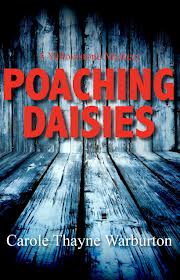 CAROLE: I write about places where I have a very strong connection. The setting is very important in each of my novels. POACHING DAISIES was set in the small tourist town of Silver Gate where my grandma and grandpa built a cabin in 1960. The town is one mile outside of Yellowstone.
CAROLE: I write about places where I have a very strong connection. The setting is very important in each of my novels. POACHING DAISIES was set in the small tourist town of Silver Gate where my grandma and grandpa built a cabin in 1960. The town is one mile outside of Yellowstone.
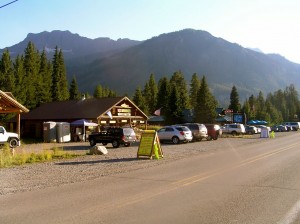 (Here’s a picture of the town)
(Here’s a picture of the town)
Several years ago, when we were visiting, they had a town meeting about eradicating the oxeye daisy, an invasive species. At the time, it was very popular to plant this flower in your summer yard. The problem is the problem-free flower would take over native grasses. The “environmentalists” took the task of eradicating it very seriously. A story began to brew in my mind. Then I brought in another problem that had been in the news and that was poaching bears and harvesting certain organs for “medicinal” purposes. I found the two a pretty fun match for a suspense novel set in the park. (It does sound fun!)
ME: I have to be honest and say that I’ve been struck by the seriousness of some of your blog postings of late. It makes me wonder if you might have a deeper, more serious novel working its way up in you–something beyond genre fiction. How do you respond to that?
CAROLE: I wondered if anyone noticed the seriousness of my posts. I’ve had a difficult year emotionally. Just when we start to feel comfortable, things shift–beliefs shift–leaving us feeling wobbly at times. Issues and difficulties in life literally keep me awake at night. I’ve found that if I can write about it, I can go to sleep. For me, writing in a journal doesn’t work. I like the idea that someone else might benefit, relate, or think about something I have to say.
I was raised in a home of strongly opinionated people. We didn’t discuss, we argued. (Me too!) As I grew up and developed my own beliefs, I found those clashing with my family and with many of my friends and neighbors in Utah. Something I’ve grown to feel passionate about is that, as a society and as a church, we’ve left some people without options. Four years ago I witnessed the tragic death of a young man. Since that time, my heart has felt more deeply than it ever had before. I never stop thinking about the fragility of life. I ache with the thought of the mother and father whose son never came home again. And yet I’ve heard of some parents turning their backs on a child because he or she is gay or because they left their faith. I don’t know how anyone recovers from losing a child, but choosing to lose a child because they aren’t what you think they should be breaks my heart.
I do know that, as writers, we take all of the stuff around us and it will come out in some way in our writing. But letting ourselves feel, really feel what’s happening or could happen is painful. I’ve been helping a friend to write her story. She came out as a Lesbian to her husband of sixteen years and that is one of the biggest reasons her marriage ended. She has a story to tell and I’d like to help her get it out. The seriousness of the subject is something that requires a lot of skill and grace. I hope to be up to the challenge. Creative non-fiction is my favorite kind of writing.
ME: I know you’re a hiker. Looking back on all the hiking/camping trips you’ve taken, which has been your favorite and why? (And please provide pictures, if possible.) Also, have you ever gotten a good idea for a novel out of one of your hikes?
CAROLE: Choosing a favorite hike might be as hard as choosing a favorite novel or child. When I was in high school I had a good friend who lived up Provo Canyon. She really got me into hiking. We hiked lots of trails in the canyon and hiked to the top of Mount Timpanogas several times every summer. It’s about a 15-mile roundtrip hike and has a lot of wildflowers. I was lucky enough to marry a man who loves to hike as much as I do. Together we hike all the trails in Logan canyon and around us. One of our favorites is to Jardine Juniper, a barely alive gnarly tree that is 3200 years old.
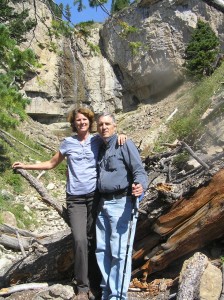 (Carole with her husband above on a hike near Silver Gate–setting of POACHING DAISIES…and with her daughter below on the Crimson Trail in Logan Canyon)
(Carole with her husband above on a hike near Silver Gate–setting of POACHING DAISIES…and with her daughter below on the Crimson Trail in Logan Canyon)
(With members of her writing group at Jardine Juniper for a birthday hike)
In Yellowstone, we like to do several hikes each trip and always try to find one we haven’t done yet. Our children and grandchildren all hike. It’s part of being in our family. Everyone knows I do an annual birthday hike. Anyone can come and it’s a way I’ve learned to deal with growing older. (Sounds like a terrific tradition, as long as you stay in shape.)
I haven’t gotten a specific idea for a novel, but Poaching Daisies includes several of the hikes I’ve done in the Yellowstone area. The opening scene with a dead bear and gunshot takes place on a hike that I have done several times.
ME: Please describe your writing space and what makes it uniquely fit with you.
CAROLE: My friend, whose story I want to write, gave me a lovely desk to thank me for the efforts I’d made in helping her. The desk fits perfectly in our new upstairs. I take turns writing at the desk with the spectacular view behind me, or I sit on a recliner and write on my laptop and look out at another mountain view.
(Riding her bike near her home in Avon, Utah)
(Springtime in Avon)
I love to write outside on our wrap-around porch, but can’t deal with the glare, so I usually end up coming inside. I wrote most of my novels in the house we lived in in Paradise at the kitchen table. I love the flexibility of a laptop and honestly don’t think I would enjoy writing a novel on a desktop again.
ME: Finally, what are you working on now both in pottery and writing, and how would you describe your writing process?
CAROLE: I’m not actively writing anything right now. I’ve started my memoirs, which are mostly just for fun, although I hope, at some point, some part of it can become marketable. I am trying to get back with my friend and help her write her story. I keep thinking about novel ideas and love some of my characters that I would like to meet up with again. I keep thinking about how Sunny Day from my book FALSE PRETENSES of a decade ago would love to meet Iris MacAfee from POACHING DAISIES. I hear new stories from friends in Grouse Creek, and that makes me want to write another novel set there. The town is down to only about 70 people and the school has only about seven students. That is a lot smaller than when my husband and I taught there twenty years ago. It’s such a unique setting that the story ideas are easily mined.
As far as my pottery, I love functional pottery. I love that small pieces of art are gracing the homes of typical families. Because it’s such an affordable art to own, so many more people can enjoy it. I’m working at building and marketing my business. And of course ideas are always coming to change designs and styles.
If you’d like to read more from Carole or see more examples of her pottery, check out her blog. POACHING DAISIES is currently available on Amazon.
Originally posted 2013-03-13 06:00:33.

